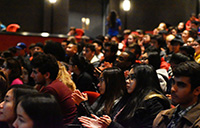Two trailblazers in science inspired more than 350 bright young minds on Oct. 22 during the 2015 Gairdner Student Outreach Lecture at York University.
The group came together in honour of the annual Gairdner Awards, which celebrate scientists whose findings significantly advance medical and pharmaceutical research to help improve global health.
The excited energy in the Sandra Faire and Ivan Fecan Theatre was palpable as high school students waited to hear about the academic and professional journeys of two award-winning scientists, Salim Yusuf and Michael Salter.

Yusuf is a 2014 Canada Gairdner Wightman Laureate and Salter is the chief of research and senior scientist in Neuroscience and Mental Health at the Toronto Hospital for Sick Children Research Institute. The two guests were introduced by Waqar Ahmad, a fourth-year honours biomedical sciences student at York. Ahmad is the recipient of a Natural Sciences and Engineering Research Council of Canada (NSERC) Undergraduate Summer Research Award for two consecutive years, in 2014 and 2015.
With humor and honesty, Yusuf recounted his 35-year adventure in preventing cardiovascular diseases. He began his story with his childhood in India, growing up in a middle-class family that valued education. His life’s work started small, with a project he did not initially consider research. It involved controlling a water-borne epidemic in India by testing the water and determining a chlorine brand. Woven into his story were valuable lessons for the young future scientists.

“The most important lesson in research is to think and to discuss. I learned to work hard, be humble and seek help because others will be helpful if you ask,” he said. Yusuf continued by advising students to “always make friends before collaborators.”
Yusuf also encouraged budding scientists to “look at the problems in your community and ask yourself if any of the problems are small enough for you to tackle.”
The desire to do research, he stressed, has to come from within and should not be hampered by fear of rejection and disappointment.
Salter’s curiosity about how nerve cells in the brain connect to one another also began at an early age, while he was in the fifth grade. He said hockey icon Bobby Orr, space pioneer Neil Armstrong and the “godfather of neurobiology,” Pío del Río Hortega, are all figures who continue to motivate his work on chronic pain.
Salter echoed Yusuf’s sentiments about the importance of collaboration, saying “The most important thing in science is to have great ideas and to communicate effectively with other people.”

The all-day event for high-school students was organized by Ron Pearlman, former dean of the Faculty of Graduate Studies and associate scientific director and coordinator of the Student Outreach Program at the Gairdner Foundation, as well as Kate Duncan from VPS Recruitment and Katrina Angel from the Faculty of Science.
Following the presentation for the high school students, faculty, post-doctorate fellows, graduate and undergraduate students were invited to attend research lectures given by Salter and Yusuf.
High school students at the event also had the opportunity to tour the campus and learn more about the 17 undergraduate programs and the unique collaborative learning environment offered by the Faculty of Science.
More opportunities to see what a day at York science feels like are available by visiting Explore Science.


